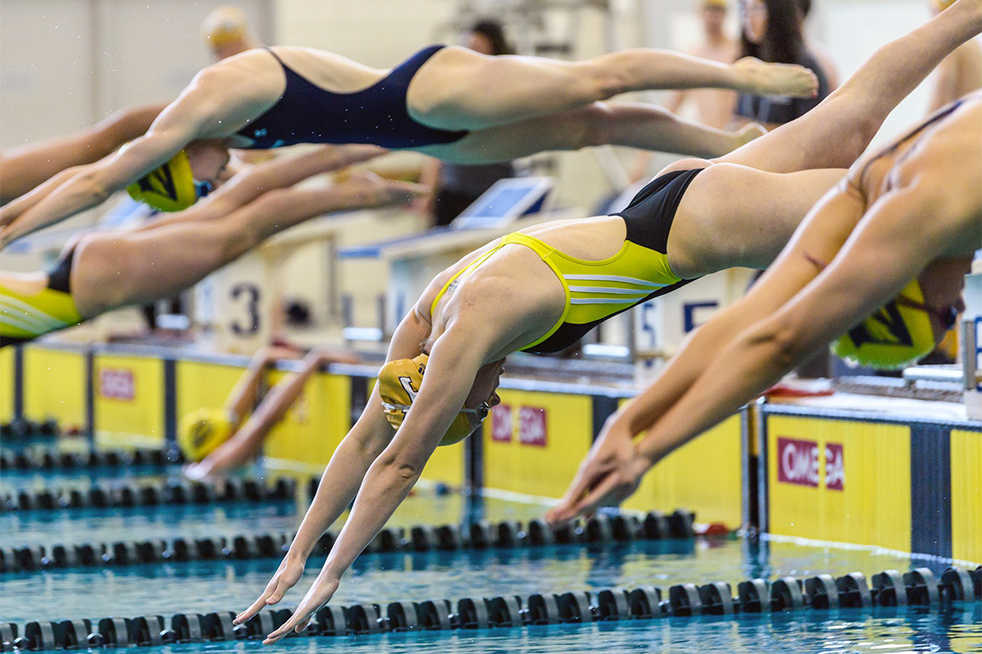The swimming and diving season concludes with championship meets, the highest level of which is the NCAA Championships. The women’s championships are held a week before the men’s, but both competitions often result in new American records and times that shatter previous barriers in the swimming and diving realms. The Jackets had five athletes in total compete at the meets — one woman and four men that already have their names spread across the Tech Swimming and Diving record boards, even as two of them are only freshmen.
After nearly three years of competing for Tech and a near-invitation to the national meet last year, Iris Wang was invited to the 2018 NCAA Championships in Columbus, Ohio specifically for her 100 freestyle, while also having the chance to race in the 50 and 200 freestyle events. After setting multiple school records throughout the regular season, the Chinese Olympian excelled in her sprint freestyle events — the 50, 100, and 200 freestyle — at the postseason meet.
Wang’s history of competition at the highest level not only made her a fitting candidate to be invited to the NCAA, but also likely calmed her nerves. After representing China in the Olympic Games, Columbus was likely less daunting.
Going into the meet, Wang was ranked No. 17 nationally in the 100 free, but ultimately finished in No. 19 overall with a new school record of 48.21 seconds. This race was preceded by her other two races of the week, the 50 free in which she broke her own school record with a time of 22.54, and the 200 free in which she raced to her third-fastest time during the season. Her 50 free placed No. 37 for the Jackets, while her 200 free was awarded No. 32 place overall, both impressive marks at the national level.
Wang was the fifth female swimmer to be invited to the NCAA Championships in the 18-year history of Georgia Tech’s Women’s Swimming and Diving program. The Industrial Design major will compete for the Jackets one more year and can be expected to lower her own records while leading the rest of the team as a senior next season.
On the men’s side, the four competitors consisted of one diver (Matt Casillas) and three swimmers (Christian Ferraro, Moises Loschi, and Caio Pumputis). The meet was held in Minneapolis, Minn. the week following the women’s championships so the men knew how high the bar, which Wang had set for them, was. Loschi returned for his third NCAA Championships, while it was a new experience for the rest of the Jackets.
The first day of the meet consisted of the men acclimating themselves to the environment and pool while preparing themselves for the rest of the week. Caio Pumputis and Christian Ferraro, the two freshmen swimmers, took charge on the second day of the meet with the 200 IM, a race that tests all strokes and is acknowledged as one of the most interesting events to watch due to the uncertainty of the winner until the last 25 yards of the race. Pumputis finished No. 36 with a time of 1:45.54, while Ferraro placed No. 45 with a time of 1:48.24. Pumputis was eight tenths off of his career-best time, but had multiple events left to set a new bar.
On the third day of the meet, Pumputis and Loschi competed in the 100 breaststroke, tying for No. 34 place with a time of 53.53. The team record sits at 52.86, which the men will be working to take down over the next year. Ferraro placed No. 35 in the 100 butterfly with a time of 46.67, ranking in the top 10 times by a Jacket in the event.
The final day of swimming was highlighted by top-25 finishes by both Loschi and Ferraro in the 200 breaststroke and 200 butterfly, respectively. Both men placed 21st in their events, while Matt Casillas placed 31st in the men’s platform dive after placing a remarkable sixth place at the Zone B Championships a couple of weeks prior to the NCAA Championships. Unfortunately, Pumputis received a disqualification for his 200 breaststroke performance due to a small butterfly kick towards the end of the race.
Although Wang scored more points at the NCAA Championships than those who competed for the men’s team, the Jackets had a strong showing overall at the meet and are eager to improve going into next year’s championship season. Swimming does not have much of an offseason, so these athletes will be training and competing through the summer and preparing to blow the next season out of the water. The coaching staff was sure to note how proud they were of the athletes, yet how much improvement can still be made moving forwards. The incoming class of athletes will have high expectations considering that two of the five NCAA performers were freshmen this past season.
The goal of Tech’s swim and dive team is to become a top 25 program in the nation on both sides of the team in the near future while achieving in the classroom as well. As a team that is often known for having one of the highest average grade point averages within the Georgia Tech Athletic Association, it is clear that the athletes are well on their way to achieving that goal.
